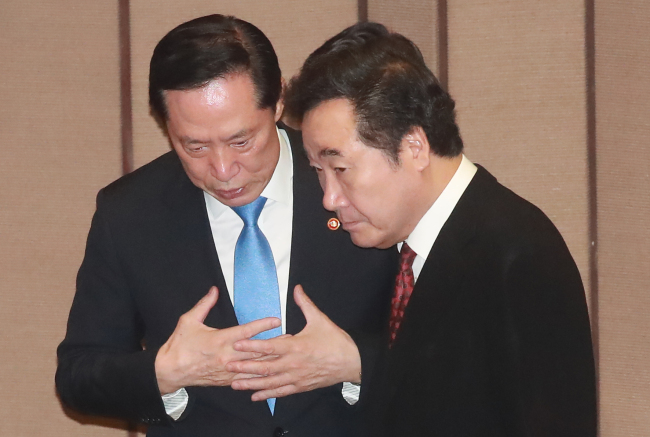Prime Minister Lee Nak-yon abruptly called off a lunch meeting with the press planned to mark his 100th day in office Thursday amid violent clashes between police and villagers in a southeastern town over the deployment of additional launchers for the US THAAD missile defense system.
Lee's office sent members of the press corps a mobile phone text message Thursday morning that the press meeting has been postponed. No specific reason was given, but sources said that tensions over the THAAD deployment were taken into consideration.
 |
Prime Minister Lee Nak-yeon speaks with Defense Minister Song Young-moo, Wednesday. (Yonhap) |
Clashes broke out in the southeastern town of Seongju as villagers fought riot police to block the installation of four additional launchers for the Terminal High Altitude Area Defense battery aimed at bolstering the defense against North Korean missile threats.
Dozens of residents and police were injured.
Despite the clashes, the launchers moved past the village and entered the deployment site. Thursday's installation, if completed, will mark the conclusion of a deployment that has plagued the nation for years amid intense opposition not only from residents but also from China.
Two THAAD launchers had already been installed during the administration of ousted former President Park Geun-hye. Upon taking office, President Moon Jae-in put on hold the installation of the remaining four launchers pending an environmental assessment.
But Moon ordered the deployment of the additional THAAD launchers soon after North Korea launched a second intercontinental ballistic missile in late July.
China has long protested the deployment, saying THAAD hurts its security interests. Beijing has taken a number of economic retaliatory measures against the South as Seoul refused to give in to Chinese pressure to scrap the decision to host the system.
Earlier this week, Lee said that South Korea should offer sincere explanations to China about its decision to host THAAD, saying Beijing sees the decision as a violation of trust and faith in its relations with Seoul.
Since taking office on May 31, Lee has taken on a series of hard-to-tackle, contentious issues. His office is in charge of ironing out differences between residents and government over THAAD, but it is also responsible for gauging public opinion on a proposal to scrap the construction of two nuclear power reactors in the southeastern city of Ulsan. (Yonhap)







![[Weekender] Korea's traditional sauce culture gains global recognition](http://res.heraldm.com/phpwas/restmb_idxmake.php?idx=644&simg=/content/image/2024/11/21/20241121050153_0.jpg)
